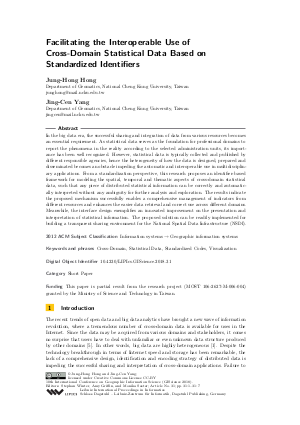Facilitating the Interoperable Use of Cross-Domain Statistical Data Based on Standardized Identifiers (Short Paper)
Authors Jung-Hong Hong, Jing-Cen Yang
-
Part of:
Volume:
10th International Conference on Geographic Information Science (GIScience 2018)
Part of: Series: Leibniz International Proceedings in Informatics (LIPIcs)
Part of: Conference: International Conference on Geographic Information Science (GIScience) - License:
 Creative Commons Attribution 3.0 Unported license
Creative Commons Attribution 3.0 Unported license
- Publication Date: 2018-08-02
File

PDF
LIPIcs.GISCIENCE.2018.31.pdf
- Filesize: 467 kB
- 7 pages
Document Identifiers
Subject Classification
ACM Subject Classification
- Information systems → Geographic information systems
Keywords
- Cross-Domain
- Statistical Data
- Standardized Codes
- Visualization
Metrics
- Access Statistics
-
Total Accesses (updated on a weekly basis)
0Document
0Metadata
Abstract
In the big data era, the successful sharing and integration of data from various resources becomes an essential requirement. As statistical data serves as the foundation for professional domains to report the phenomena in the reality according to the selected administration units, its importance has been well recognized. However, statistical data is typically collected and published by different responsible agencies, hence the heterogeneity of how the data is designed, prepared and disseminated becomes an obstacle impeding the automatic and interoperable use in multidisciplinary applications. From a standardization perspective, this research proposes an identifier-based framework for modeling the spatial, temporal and thematic aspects of cross-domain statistical data, such that any piece of distributed statistical information can be correctly and automatically interpreted without any ambiguity for further analysis and exploration. The results indicate the proposed mechanism successfully enables a comprehensive management of indicators from different resources and enhances the easier data retrieval and correct use across different domains. Meanwhile, the interface design exemplifies an innovated improvement on the presentation and interpretation of statistical information. The proposed solution can be readily implemented for building a transparent sharing environment for the National Spatial Data Infrastructure (NSDI).
Cite As Get BibTex
Jung-Hong Hong and Jing-Cen Yang. Facilitating the Interoperable Use of Cross-Domain Statistical Data Based on Standardized Identifiers (Short Paper). In 10th International Conference on Geographic Information Science (GIScience 2018). Leibniz International Proceedings in Informatics (LIPIcs), Volume 114, pp. 31:1-31:7, Schloss Dagstuhl – Leibniz-Zentrum für Informatik (2018)
https://doi.org/10.4230/LIPIcs.GISCIENCE.2018.31
BibTex
@InProceedings{hong_et_al:LIPIcs.GISCIENCE.2018.31,
author = {Hong, Jung-Hong and Yang, Jing-Cen},
title = {{Facilitating the Interoperable Use of Cross-Domain Statistical Data Based on Standardized Identifiers}},
booktitle = {10th International Conference on Geographic Information Science (GIScience 2018)},
pages = {31:1--31:7},
series = {Leibniz International Proceedings in Informatics (LIPIcs)},
ISBN = {978-3-95977-083-5},
ISSN = {1868-8969},
year = {2018},
volume = {114},
editor = {Winter, Stephan and Griffin, Amy and Sester, Monika},
publisher = {Schloss Dagstuhl -- Leibniz-Zentrum f{\"u}r Informatik},
address = {Dagstuhl, Germany},
URL = {https://drops.dagstuhl.de/entities/document/10.4230/LIPIcs.GISCIENCE.2018.31},
URN = {urn:nbn:de:0030-drops-93595},
doi = {10.4230/LIPIcs.GISCIENCE.2018.31},
annote = {Keywords: Cross-Domain, Statistical Data, Standardized Codes, Visualization}
}
Author Details
Funding
This paper is partial result from the research project (MOST 106-2627-M-006-004) granted by the Ministry of Science and Technology in Taiwan.
References
-
Amir Gandomi and Murtaza Haider. Beyond the hype: Big data concepts, methods, and analytics. International Journal of Information Management, 35(2):137-144, 2015.

-
Evangelos Kalampokis, Efthimios Tambouris, Areti Karamanou, and Konstantinos Tarabanis. Open statistics: The rise of a new era for open data? In International Conference on Electronic Government and the Information Systems Perspective, pages 31-43. Springer, 2016.

-
Corinna Koebnick, Annette M Langer-Gould, Michael K Gould, Chun R Chao, Rajan L Iyer, Ning Smith, Wansu Chen, and Steven J Jacobsen. Sociodemographic characteristics of members of a large, integrated health care system: comparison with us census bureau data. The Permanente Journal, 16(3):37, 2012.

-
Pei-Wen Weng and Bor-Wen Tsai. Spatial dispersion index: old conception, new formula. Journal of Taiwan Geographic Information Science, 4:1-12, 2006.

-
Yu Zheng. Methodologies for cross-domain data fusion: An overview. IEEE transactions on big data, 1(1):16-34, 2015.

